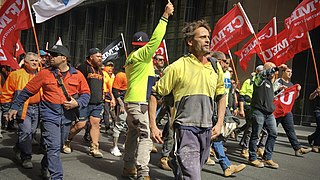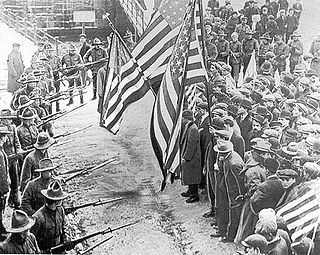Related Research Articles

Strike action, also called labor strike, labour strike in British English, or simply strike, is a work stoppage caused by the mass refusal of employees to work. A strike usually takes place in response to employee grievances. Strikes became common during the Industrial Revolution, when mass labor became important in factories and mines. As striking became a more common practice, governments were often pushed to act. When government intervention occurred, it was rarely neutral or amicable. Early strikes were often deemed unlawful conspiracies or anti-competitive cartel action and many were subject to massive legal repression by state police, federal military power, and federal courts. Many Western nations legalized striking under certain conditions in the late 19th and early 20th centuries.
The United States textile workers' strike of 1934, colloquially known later as The Uprising of '34 was the largest textile strike in the labor history of the United States, involving 400,000 textile workers from New England, the Mid-Atlantic states and the U.S. Southern states, lasting twenty-two days.

The Lawrence Textile Strike, also known as the Bread and Roses Strike, was a strike of immigrant workers in Lawrence, Massachusetts, in 1912 led by the Industrial Workers of the World (IWW). Prompted by a two-hour pay cut corresponding to a new law shortening the workweek for women, the strike spread rapidly through the town, growing to more than twenty thousand workers and involving nearly every mill in Lawrence. On January 1, 1912, the Massachusetts government enforced a law that cut mill workers' hours in a single work week from 56 hours, to 54 hours. Ten days later, they found out that pay had been reduced along with the cut in hours.
Amalgamated Clothing Workers of America (ACWA) was a United States labor union known for its support for "social unionism" and progressive political causes. Led by Sidney Hillman for its first thirty years, it helped found the Congress of Industrial Organizations. It merged with the Textile Workers Union of America (TWUA) in 1976 to form the Amalgamated Clothing and Textile Workers Union (ACTWU), which merged with the International Ladies' Garment Workers' Union in 1995 to create the Union of Needletrades, Industrial and Textile Employees (UNITE). UNITE merged in 2004 with the Hotel Employees and Restaurant Employees Union (HERE) in 2004 to create a new union known as UNITE HERE. After a bitter internal dispute in 2009, the majority of the UNITE side of the union, along with some of the disgruntled HERE locals left UNITE HERE, and formed a new union named Workers United, led by former UNITE president Bruce Raynor.

The Women's Trade Union League (WTUL) (1903–1950) was a U.S. organization of both working class and more well-off women to support the efforts of women to organize labor unions and to eliminate sweatshop conditions. The WTUL played an important role in supporting the massive strikes in the first two decades of the twentieth century that established the International Ladies' Garment Workers' Union and Amalgamated Clothing Workers of America and in campaigning for women's suffrage among men and women workers.

Joseph James "Smiling Joe" Ettor (1885–1948) was an Italian-American trade union organizer who, in the middle-1910s, was one of the leading public faces of the Industrial Workers of the World. Ettor is best remembered as a defendant in a controversial trial related to a killing in the seminal Lawrence Textile Strike of 1912, in which he was acquitted of charges of having been an accessory.

The 1913 Paterson silk strike was a work stoppage involving silk mill workers in Paterson, New Jersey. The strike involved demands for establishment of an eight-hour day and improved working conditions. The strike began in February 1913, and ended five months later, on July 28. During the course of the strike, approximately 1,850 strikers were arrested, including Industrial Workers of the World (IWW) leaders Bill Haywood and Elizabeth Gurley Flynn.

Duggie Brown was an English comedian and actor. He was the younger brother of actress and singer Lynne Perrie.

The Loray Mill strike of 1929 in Gastonia, North Carolina, was a notable strike action in the labor history of the United States. Though largely unsuccessful in attaining its goals of better working conditions and wages, the strike was considered successful in a lasting way; it caused an immense controversy which gave the labor movement momentum in the South.

Anna LoPizzo was an Italian immigrant striker killed during the Lawrence Textile Strike, considered one of the most significant struggles in U.S. labor history.

Emil Rieve was an American labor leader. He was president of the Textile Workers Union of America (TWUA) from 1939 to 1956, a vice president of the Congress of Industrial Organizations (CIO) from 1939 to 1955, and a vice president of the AFL-CIO from 1955 to 1960.
The Passaic Textile Strike is a 1926 American silent film directed by Samuel Russak and produced by Alfred Wagenknecht. The film was produced to raise public awareness and financial support for the 1926 Passaic Textile Strike, which involved over 15,000 New Jersey textile mill workers in a work stoppage lasting more than a year. Although in good part a fictional melodrama, The Passaic Textile Strike is regarded as important by film historians both for its documentary footage and for the fact that it is one of the only early American labor films to have been preserved largely intact.

The 1926 Passaic textile strike was a work stoppage by over 15,000 woolen mill workers in and around Passaic, New Jersey, over wage issues in several factories in the vicinity. Conducted in its initial phase by a "United Front Committee" organized by the Trade Union Educational League of the Workers (Communist) Party, the strike began on January 25, 1926, and officially ended only on March 1, 1927, when the final mill being picketed signed a contract with the striking workers. It was the first Communist-led work stoppage in the United States. The event was memorialized by a seven reel silent movie intended to generate sympathy and funds for the striking workers.
Kenith Trodd is a British television producer best known for his professional association with television playwright Dennis Potter.

"The Spongers" is the 14th episode of eighth season of the British BBC anthology TV series Play for Today. The episode was a television play that was originally broadcast on 24 January 1978. "The Spongers" was written by Jim Allen, directed by Roland Joffé, produced by Tony Garnett, and starred Christine Hargreaves, Bernard Hill, Peter Kerrigan, and Paula McDonagh.

The Montreal Cottons Company strike of 1946 was a hundred-day-long strike in which 3,000 mill workers from Salaberry-de-Valleyfield, Quebec, fought for the right to obtain a collective agreement. Mill workers in Valleyfield walked off the job on June 1, 1946, as part of a larger textile strike movement which included one of Dominion Textile's mills located within Montreal. The strikes were organized by the Textile Workers Union of America (TWUA), an international union. In Valleyfield, Kent Rowley and Madeleine Parent acted as representatives of the UTWA.

The 1928 New Bedford textile strike was a mass work stoppage of approximately 30,000 machinery operatives in several of the large cotton mills located in New Bedford, Massachusetts, USA. The strike, which ran for several months during the spring and summer of 1928, is remembered for the prominent role played by the Workers (Communist) Party of America in mobilizing the immigrant workers of the region.

The National Federation of Women Workers (NFWW) was a trade union in the United Kingdom of Great Britain and Ireland active in the first part of the 20th century. Instrumental in winning women workers the right to a minimum wage for the first time, the NFWW broke down barriers for women's membership in trade unions in general.

The 1907 Skowhegan textile strike was a labor dispute between approximately 225 mill workers and the owners of the Marston Worsted Mill in Skowhegan, Maine, United States. Declared following the firing of 17 year-old French Canadian-American girl named Mamie Bilodeau, the strike was the first successful strike involving the recently formed Industrial Workers of the World.
The 1914–1915 Fulton Bag and Cotton Mills strike was a labor strike involving several hundred textile workers from the Fulton Bag and Cotton Mills in Atlanta, Georgia, United States. The strike, which involved about 500 millworkers, began on May 20, 1914, and ended almost a year later on May 15, 1915, in failure for the strikers.